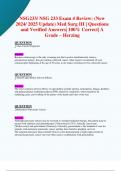Exam (elaborations)
NSG233/ NSG 233 Exam 4 Review: (New 2024/ 2025 Update) Med Surg III | Questions and Verified Answers| 100% Correct| A Grade – Herzing
- Course
- Institution
NSG233/ NSG 233 Exam 4 Review: (New 2024/ 2025 Update) Med Surg III | Questions and Verified Answers| 100% Correct| A Grade – Herzing
[Show more]



